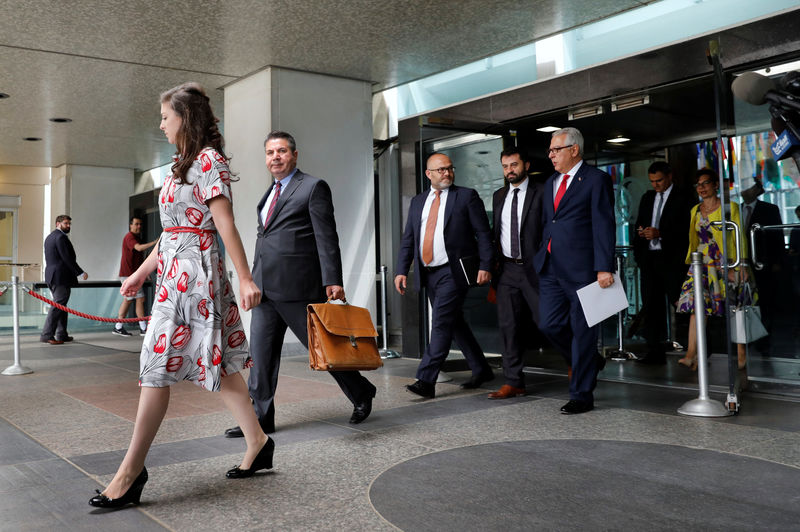Street Calls of the Week
By Lesley Wroughton and Jonathan Landay
WASHINGTON (Reuters) - A Turkish delegation met with the State Department's No. 2 official, John Sullivan, on Wednesday to address friction between the NATO allies fueled by Ankara's detention of several Americans including an evangelical pastor.
There were no signs of a breakthrough, however, after the hour-long talks.
Turkey's lira weakened against the dollar on Wednesday, hit by concern about President Tayyip Erdogan's grip on monetary policy and uncertainty about whether the meeting could heal their wide diplomatic rift.
The lira
"We held additional talks with Turkish officials. The conversations continue," State Department spokeswoman Heather Nauert said in a statement after the meeting.
The delegation of roughly half a dozen officials was led by newly appointed Turkish Deputy Foreign Minister Sedat Onal and Turkey's ambassador to Washington Serdar Kilic.
They did not answer questions from reporters as they left the meeting with Sullivan, the deputy secretary of state.
A U.S. Treasury spokeswoman said the delegation would also meet Treasury officials later on Wednesday.
The Treasury meeting comes a week after it imposed U.S. sanctions on Erdogan's justice minister and interior minister for reneging on a commitment to release pastor Andrew Brunson. There are also deep concerns in Ankara as the United States considers a fine against Turkey's state-owned Halkbank for allegedly helping Iran evade U.S. sanctions.
The two countries remain at odds on the core U.S. demand that Ankara free Brunson.
The State Department has said little about its talks with Turkey over Brunson, although it acknowledged on Tuesday that Secretary of State Mike Pompeo had spoken to his Turkish counterpart on Monday.
Nauert told a briefing the two had not yet reached agreement on the release of Brunson. "We're not there just yet," she said in response to reports in Turkey that an agreement had been reached on several issues.
The pastor had been imprisoned by Turkey since October 2016 but was released to house arrest in late July.
Brunson, an evangelical Presbyterian pastor from North Carolina, was jailed for allegedly supporting a group that Ankara blames for an attempted coup in 2016. Brunson denies the charge. Washington is also seeking the release of three locally employed U.S. embassy staff.
Trade issues and differences over Syria have also strained bilateral ties.
The Turkish delegation "is looking for any deal because they've got to have something to go back to Ankara with," a former U.S. official familiar with both sides' positions said.
"I don’t see the U.S. side agreeing to a comprehensive settlement until they release Brunson," the official said, speaking on condition of anonymity because of the sensitivity of the issue.
The official said among a series of requests in exchange for Brunson's release, Turkey was seeking to minimize damage to Halkbank from the fine the U.S. Treasury is expected to impose. The bank has said all of its transactions have been lawful.
Turkey was also seeking the early release of Halkbank executive Mehmet Hakan Atilla, who was sentenced in May to 32 months in prison by a federal court in New York for taking part in a scheme to help Iran avoid U.S. sanctions.
Turkey is also pushing for the extradition of Fethullah Gulen, a Muslim cleric living in the United States who is accused by the Erdogan government of masterminding the failed 2016 coup, and for the delivery of advanced F-35 fighter jets blocked by Congress following Turkey’s agreement to purchase S-400 air defense missile batteries from Russia.
The administration, however, is limited in what it can agree to, the official said, because Gulen faces no charges in the United States, and the ban on the F-35 deliveries was included in the defense authorization act now awaiting Trump's signature.
Washington is reviewing Turkey's duty-free access to U.S. markets, while Ankara has imposed retaliatory tariffs on U.S. goods in response to American steel and aluminum tariffs. The U.S. review could affect $1.7 billion of Turkish exports.
Turkey's energy minister said on Wednesday Turkey will continue to buy natural gas from Iran in line with its long-term supply contract despite U.S. sanctions against Tehran.
The chill in relations with Washington has hurt investor confidence in Turkey, which relies on overseas capital to fund its widening current account deficit.
The Turkish lira has collapsed this year, pressuring banks and corporate loans and wiping out a third of the value of foreign investors' holdings of lira bonds but data shows there have not yet been net foreign portfolio sales.
